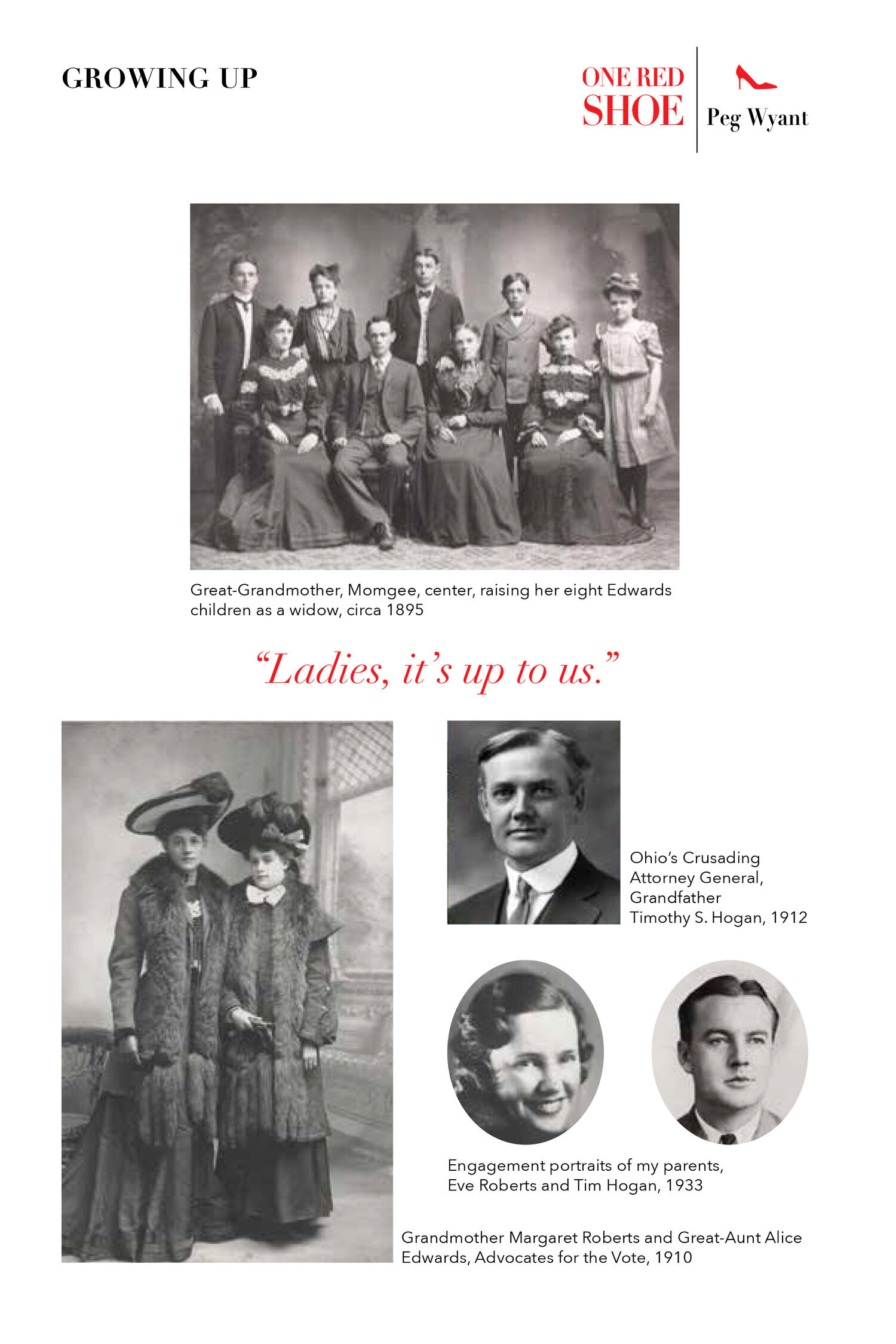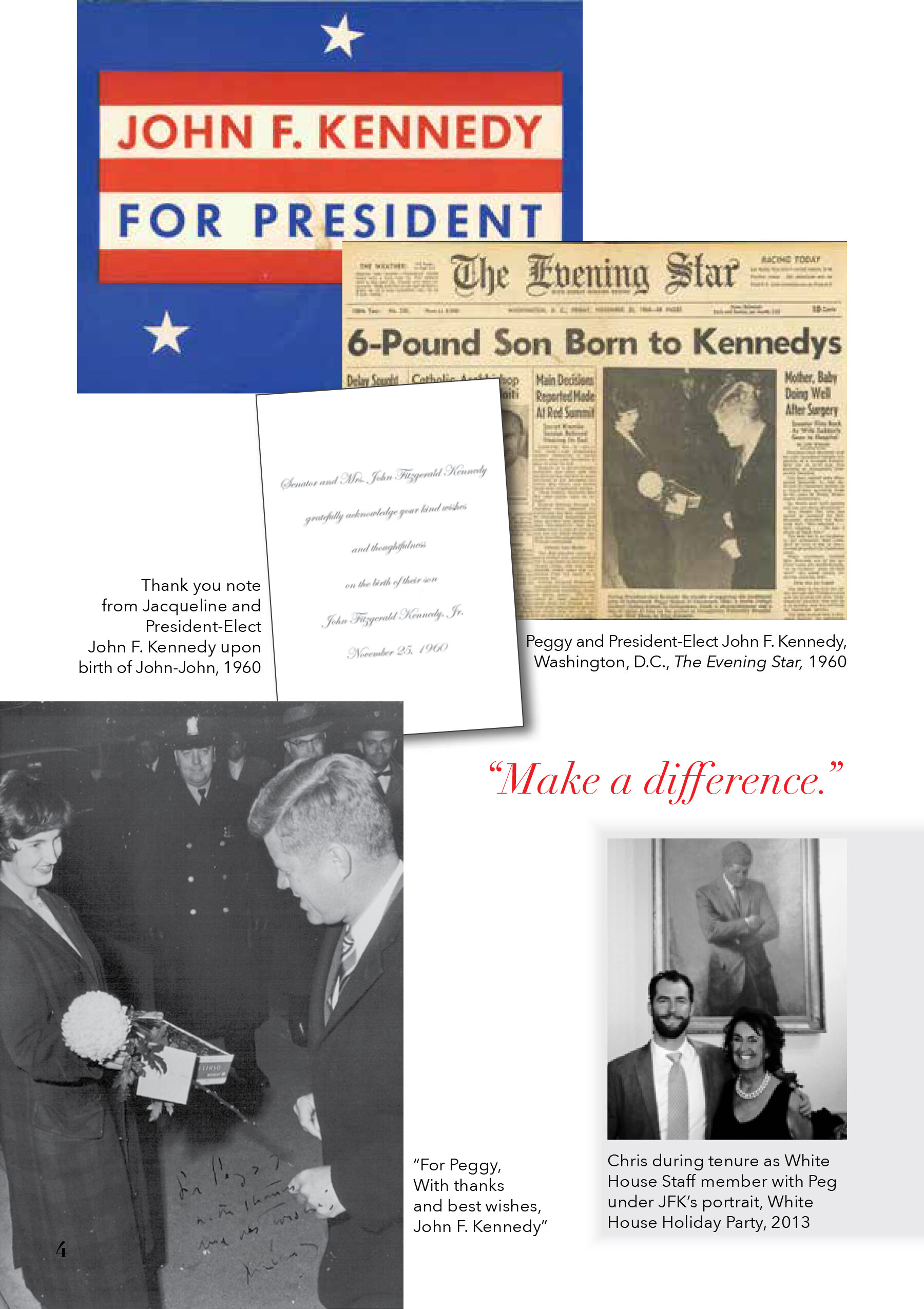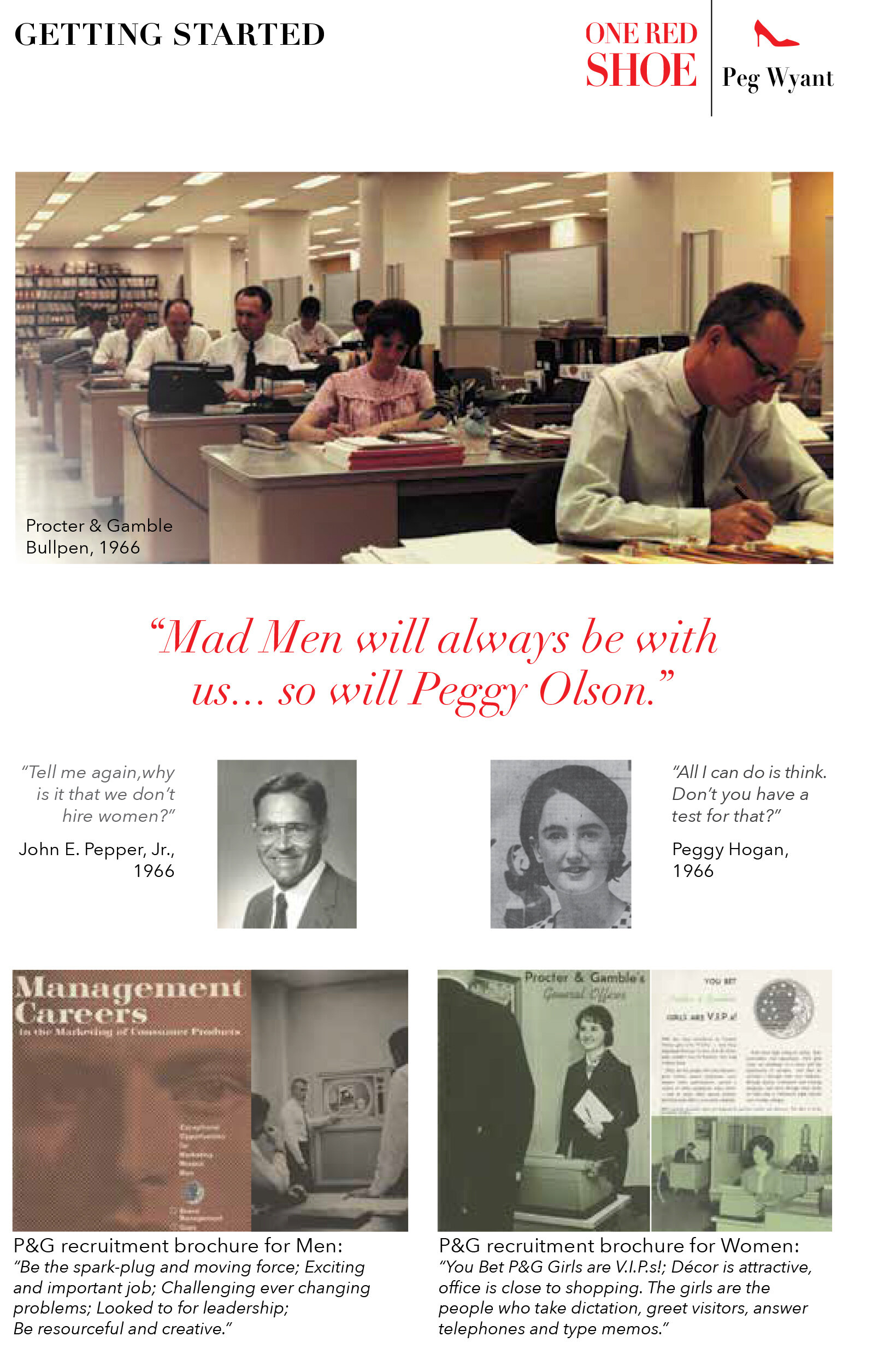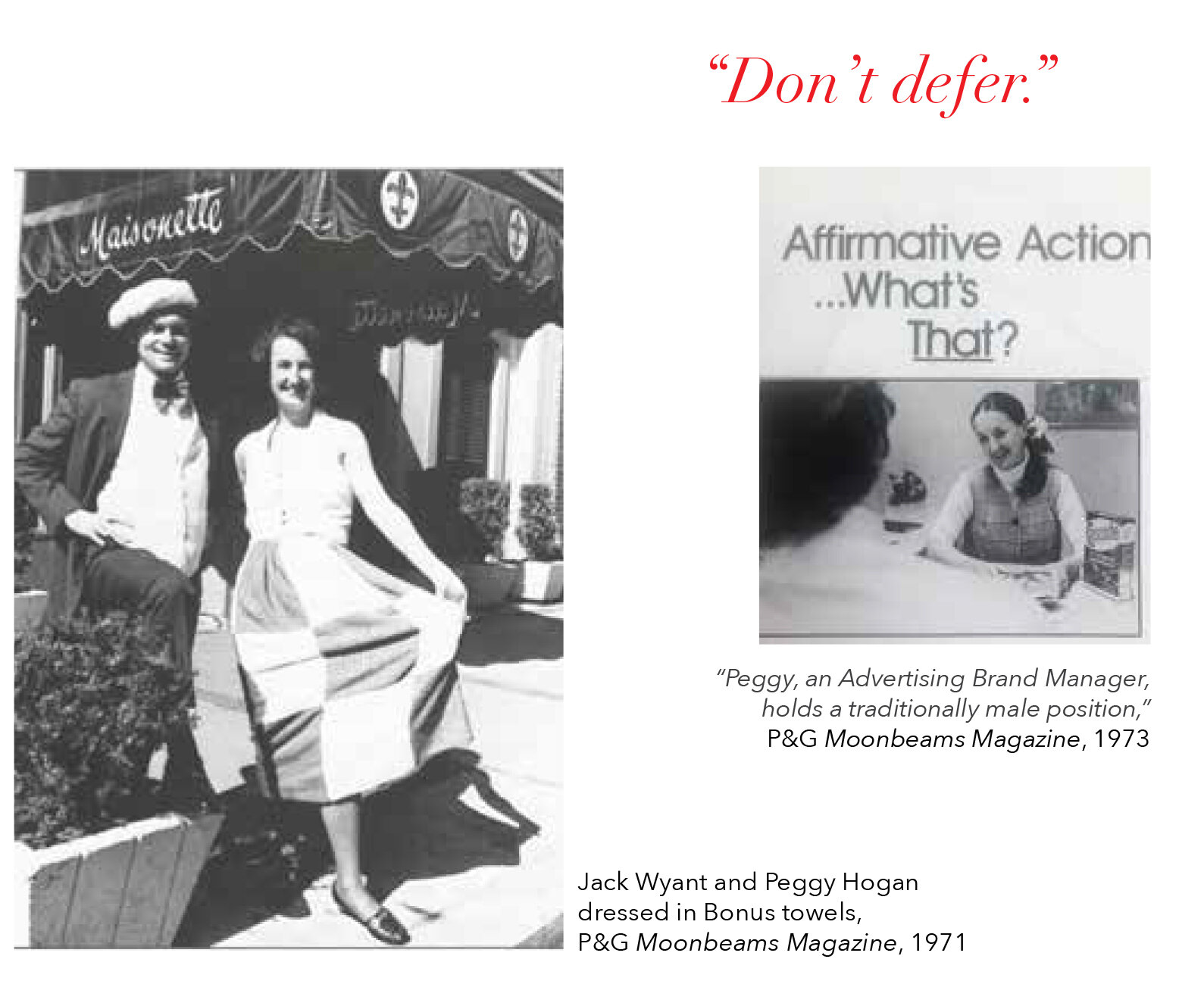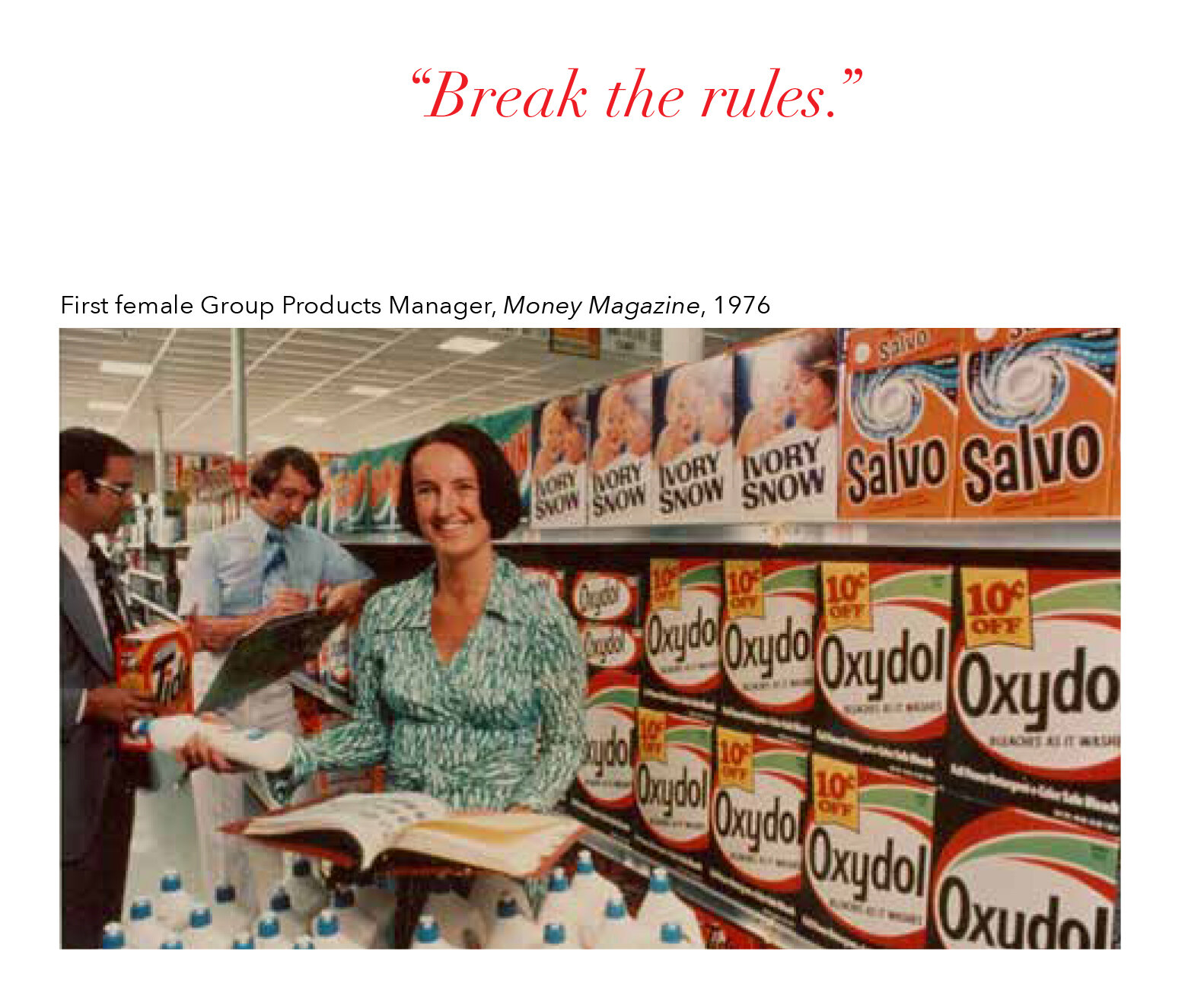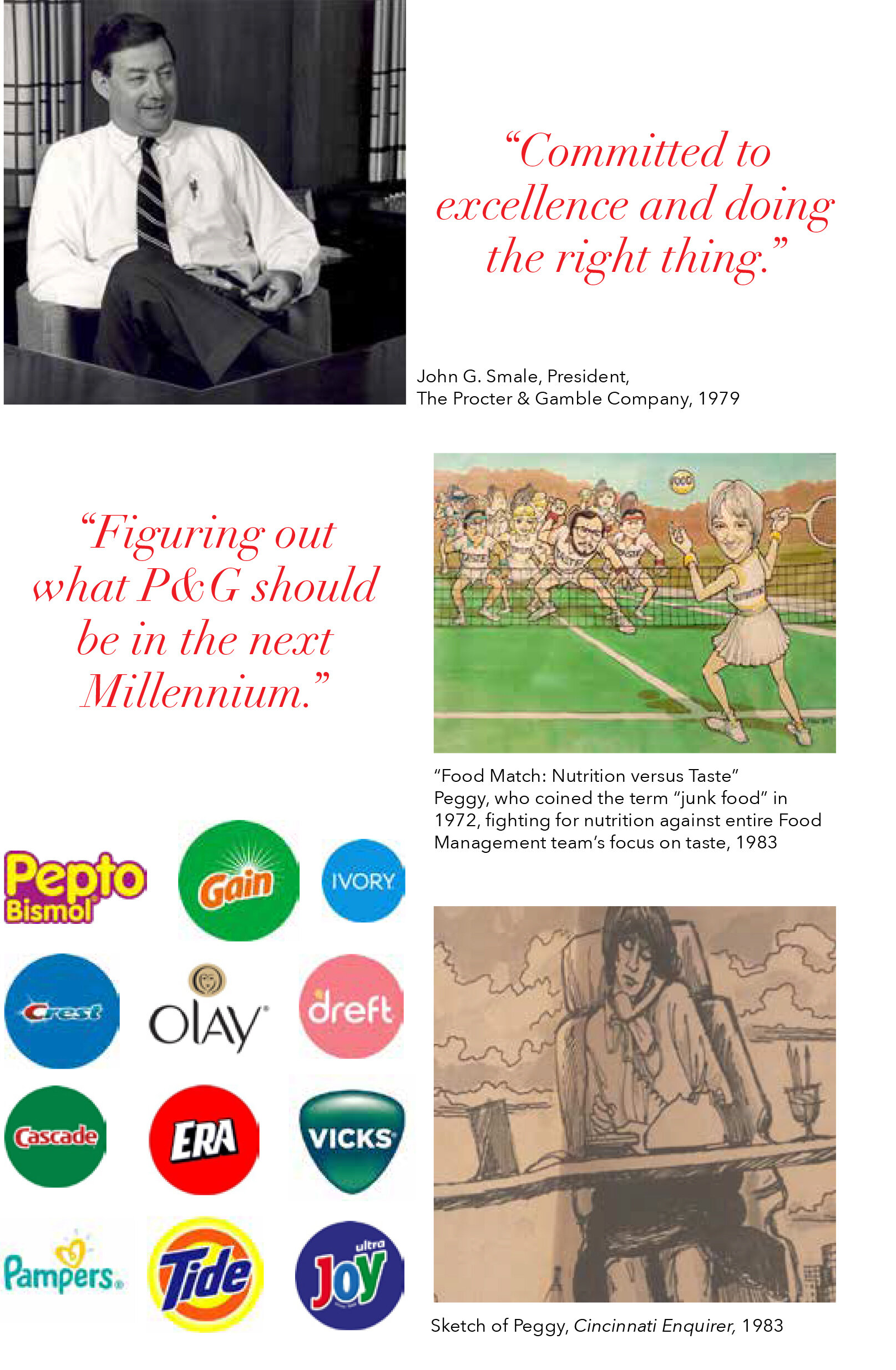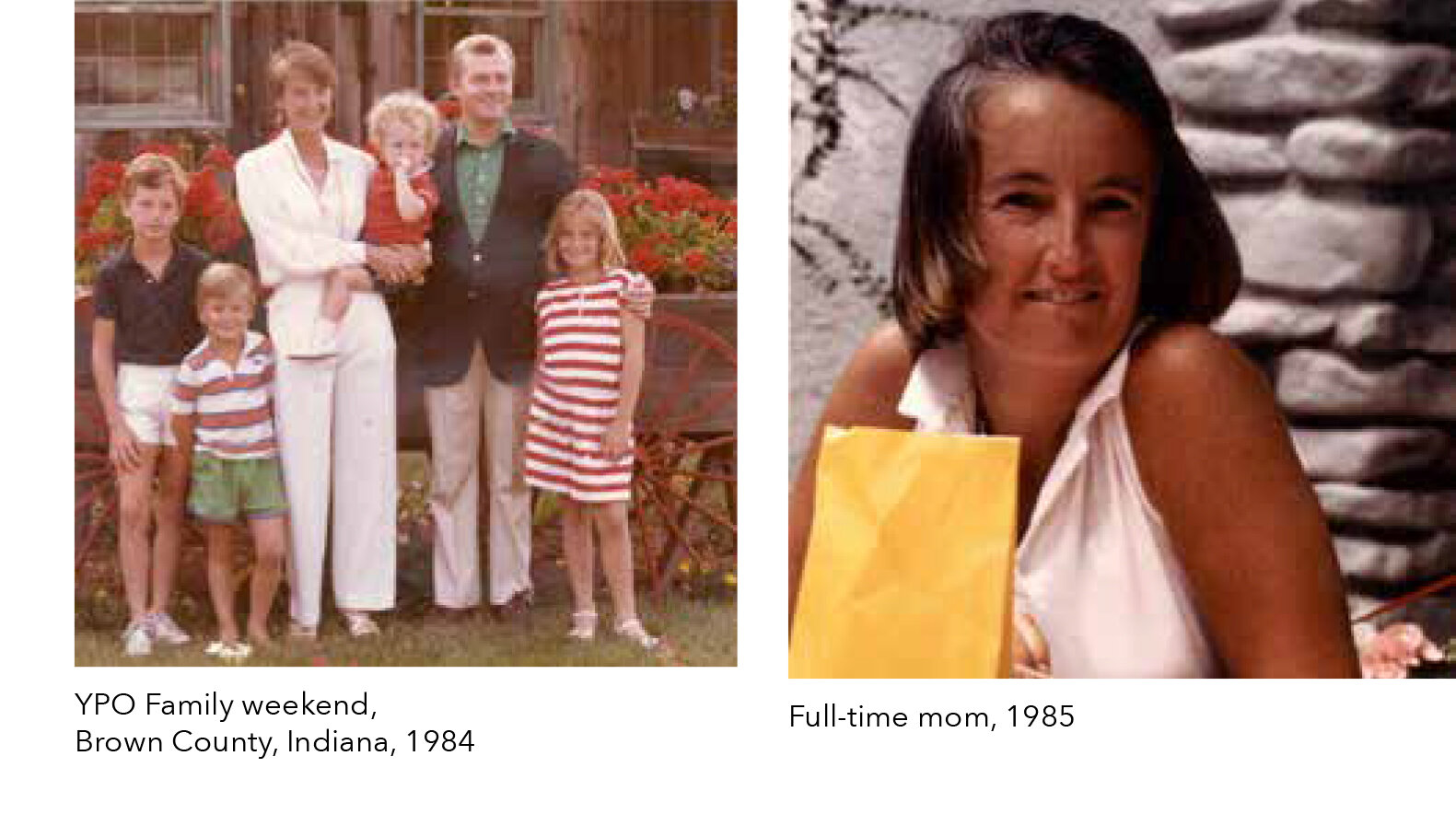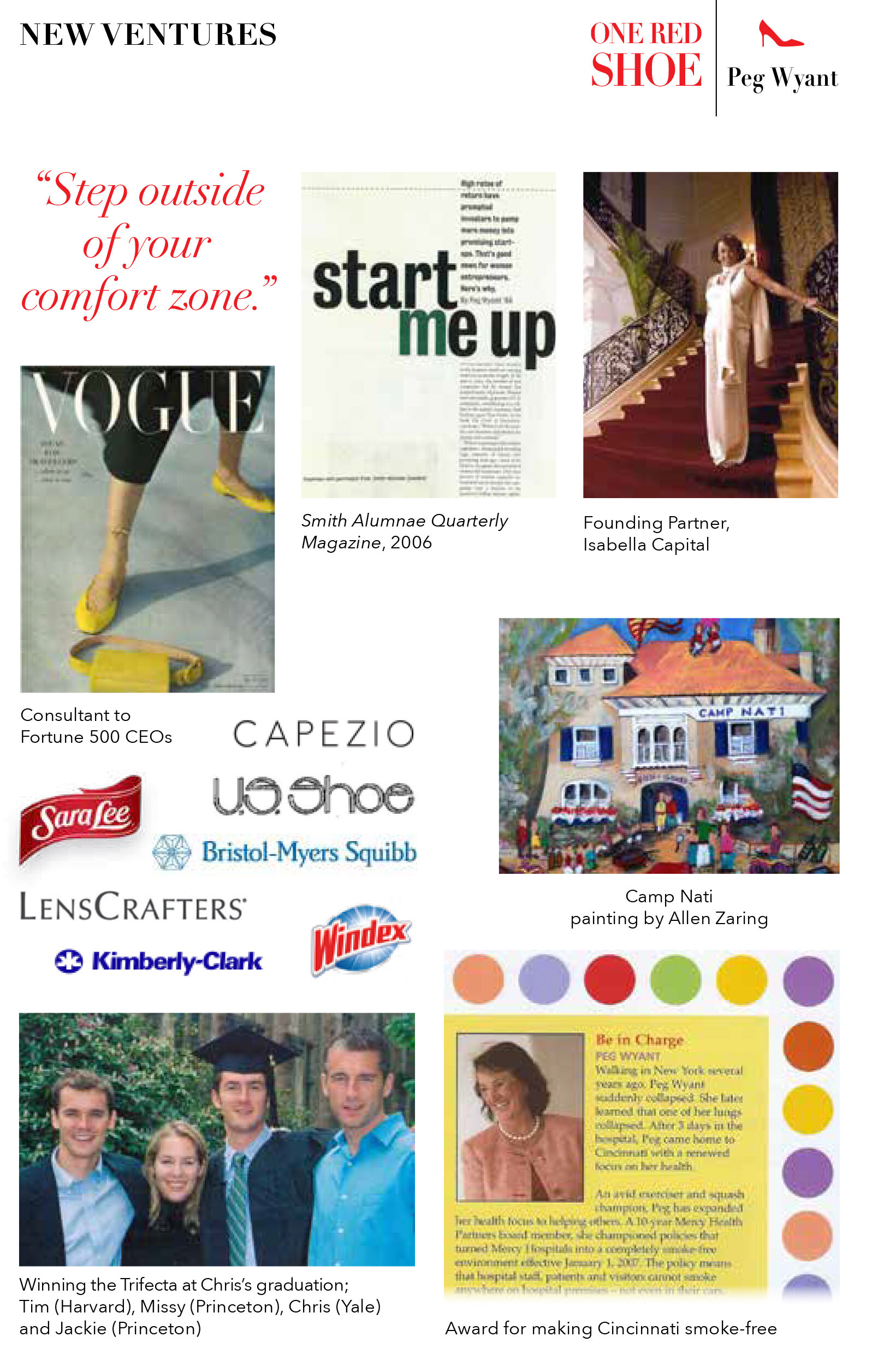The Story of
Corporate America’s First Woman.
PEG WYANT: Entrepreneur, Author and Party-crasher
Every woman juggling career and family will find illuminating Peg’s journey from Mad Men through Me Too and Motherhood
Available Now!
Coming Soon!
A Pocket Guide to Becoming a Success Party-crasher
“You’ll never read a more honest portrayal of the challenges of managing the responsibilities of work and family. The lessons embedded in chapter after chapter have much to teach as we pursue our own lives.””
Starting in the sixties when places of power and influence were open only to men, Peg Wyant tells her story. Right after college, she founded a company which led to a job at The Procter & Gamble Company. There, living through Mad Men come alive, she became a serial “first woman” from brand manager through direct report to the CEO.
It seemed nothing could stop her — not the hairy arm of a truck driver who blocked the escape route during a sit-in she led with a black Harvard law student, not a difficult divorce, not even a promiscuous senior manager who turned aggression into life threatening when he pulled a switch blade. Only the tears of a 5-year-old could do that.
Foreword
by JOHN E. PEPPER, JR.
Former CEO, The Procter & Gamble Company
Former Chairman, The Walt Disney Company
You are about to embark on a bracing journey spanning over five decades with a remarkable woman, Peg Wyant.
You will meet a woman who from her earliest years followed the precept that, “When you are truly comfortable in your own skin, not everyone will like you, but you won’t care about it one bit.” A woman who followed the precept, “The secret to winning is start before you’re ready and then persist.”
You will read about a woman who was ahead of her time, not always to her advantage but rarely with regret and ultimately achieving a life of success and fulfillment.
I came to know Peg Wyant over 50 years ago. After already launching a travel business as a young 22-year-old, she was applying for a job in marketing at Procter & Gamble. I was a brand manager. No woman had ever been hired directly into marketing before Peg. She went to take her entry test. She was asked to start with a “typing test.” Her response was, “I don’t type. All I can do is think. Don’t you have a test for that?”
I met Peg later that week. I hadn’t met anyone in recruiting at P&G who was smarter and no one with more energy. So she went on to a day of interviews. She was hired.
At The Procter & Gamble Company, Peg would achieve a series of firsts. She was the first woman to go into the field on sales training. She was the first female brand manager and the first female promotion and marketing services manager. She was the first woman to work all the way through pregnancy. In fact, she addressed P&G’s annual year-end meeting only a few days before giving birth to her first child.
And she was the first woman manager to report directly to the CEO, then John Smale, researching and recommending areas of strategic focus for the coming decade.
Wyant tells her story frankly. She pulls no punches. She spares no words in describing the challenges she faced as a woman, navigating one role after another in a corporate world where female managers were rare to non-existent. You will see the skepticism and no small amount of harassment she faced, but also the empowering support she received from many other executives.
While I was no regular fan of the television show Mad Men, Peg’s story strikes me as Mad Men brought alive through a young woman’s eyes.
Along the way, Peg had encountered a bigger challenge than anything at work – an unsuccessful first marriage. She is unsparing in describing what led to her divorce. Fortunately, a few years later, Peg met Jack Wyant, a charismatic young man also working at P&G. He became the love of her life. They remain together 47 years later.
By the time Peg concluded her work with CEO John Smale, she and Jack had four children, all under the age of 10. Jack had entrepreneurial instincts like Peg’s and was working hard, forming one new business after another. Peg concluded she could no longer balance doing the right thing for her family and for P&G. She became a full-time Mom. I don’t think you’ll ever read a more honest portrayal of the challenges of managing the responsibilities of work and family than what you will read here.
I came to know Peg Wyant over 50 years ago. After already launching a travel business as a young 22-year-old, she was applying for a job in marketing at Procter & Gamble. I was a brand manager. No woman had ever been hired directly into marketing before Peg. She went to take her entry test. She was asked to start with a “typing test.” Her response was, “I don’t type. All I can do is think. Don’t you have a test for that?”
I met Peg later that week. I hadn’t met anyone in recruiting at P&G who was smarter and no one with more energy. So she went on to a day of interviews. She was hired.
At The Procter & Gamble Company, Peg would achieve a series of firsts. She was the first woman to go into the field on sales training. She was the first female brand manager and the first female promotion and marketing services manager. She was the first woman to work all the way through pregnancy. In fact, she addressed P&G’s annual year-end meeting only a few days before giving birth to her first child.
And she was the first woman manager to report directly to the CEO, then John Smale, researching and recommending areas of strategic focus for the coming decade.
Wyant tells her story frankly. She pulls no punches. She spares no words in describing the challenges she faced as a woman, navigating one role after another in a corporate world where female managers were rare to non-existent. You will see the skepticism and no small amount of harassment she faced, but also the empowering support she received from many other executives.
While I was no regular fan of the television show Mad Men, Peg’s story strikes me as Mad Men brought alive through a young woman’s eyes.
Along the way, Peg had encountered a bigger challenge than anything at work – an unsuccessful first marriage. She is unsparing in describing what led to her divorce. Fortunately, a few years later, Peg met Jack Wyant, a charismatic young man also working at P&G. He became the love of her life. They remain together 47 years later.
By the time Peg concluded her work with CEO John Smale, she and Jack had four children, all under the age of 10. Jack had entrepreneurial instincts like Peg’s and was working hard, forming one new business after another. Peg concluded she could no longer balance doing the right thing for her family and for P&G. She became a full-time Mom. I don’t think you’ll ever read a more honest portrayal of the challenges of managing the responsibilities of work and family than what you will read here.
The journey continued. Financial challenges for the family emerged. Peg concluded she needed to go back to work. She also missed the challenges of working. She was about to break more barriers. She became a consultant for several Fortune 500 companies. Seeing that venture capital firms weren’t focused on investing in women’s businesses, she formed a venture capital firm to find she was ahead of her time. So, she started a real estate business. First, flipping homes then acquiring, renovating and managing apartment and commercial properties. It has proved very successful.
Later, Peg and Jack invested in a squash academy to help disadvantaged children on their trajectory of learning. Through the brilliant success of their four children they had discovered that squash can inspire young people to pursue their overall educational success.
You will read about how, having been barred from entering several all-male social clubs because she was a woman, Peg brought together a group of women leaders to form their own social club which did investing over good meals and conversation. That was 26 years ago. It lives on today.
You will learn about how she and Jack raised their four children. It was not a simple or easy path but one marked by one of Peg’s core values: "Never have a bad day, even though you know you will."
Toward the end of her book, Peg concludes with a list of lessons learned compiled by her administrative assistant, Betty Douglas, with whom she worked for 13 years. These are lessons which Peg lived. “You are the maker of your own destiny. Don’t let anyone hold you back.”
As you accompany Peg on her journey, you’ll find these lessons embedded in chapter after chapter of her life, through challenges, sometimes setbacks and, in the end, fulfillment and success. Peg’s and her family’s stories are unique, as all lives and families’ are. I believe you will find Peg’s story has much to teach us as we pursue our own lives.
Take A Ways
Start before you are ready
Ladies, it’s up to us
Invest in relationships
Men are stupid, women are crazy
Better to say “not me” than "me too”
Manage the playroom and the boardroom
“Mad Men” will always be with us, so will Peggy Olsen
Diversity means stronger, smarter, sharper
Doing the right thing is better for business
Figure it out
Don’t defer
Excellence is achieved, not stumbled upon
If you never give up, you can almost always get to the ball
I’m hustling every day
Launch the ship
Start with the truth
Insist upon love
Don’t break, accelerate
Seldom have a bad day
Expect to be president
I can do that
Make a difference
Discussion Guide
One Red Shoe begins in 1973 with the story about Peg giving a speech to several hundred men introducing Affirmative Action to The Procter & Gamble Company. She was nine months pregnant. Why do you think she begins with this story?
What role do you think various family members played in Peg’s development – her grandfather, the Attorney General of Ohio, whom she never met; Judge Hogan, her father; and Eve Hogan, the mother who was the most independent in the family constellation. What members of your family have been most influential? Why?
Again and again Peg starts before she is ready. What do you think is the value of that? And the risks?
Managing the boardroom and playroom is a difficult juggling act. In your mind what are the keys to success? What skills are required in each arena and are they transferable?
As the lone woman, Peg brought her unique brand of diversity to everything she did. What benefits does diversity bring to an organization?
Deciding to leave The Procter & Gamble Company was extremely difficult. Why did she leave? Do you think it was the right decision? Have you faced a similar dilemma?
There was nothing subtle about the obstacles Peg faced. Women need not apply. Rank and file men didn’t invite her to lunch. There were no laws against harassment. Today, the obstacles are often invisible. What are they and does that make progress more elusive?
What are the tools needed by the young women growing up today who want to enter the working world? How should we prepare young men to work alongside their female counterparts?
Peg’s experience crossed many fields: big business, consulting, venture capital, real estate and entrepreneurship. Where are women most and least likely to succeed and why?
The book talks about highly principled politicians. People who said, “let’s start with the truth” and were not afraid to speak their mind, refusing to keep a job at the risk of losing their integrity. Where did that kind of character go? And how do we get our children to bring it back?
Early in her career Peg didn’t claim to be a feminist. Today only 1 out of 6 women call themselves a feminist but Peg is definitely in that group. How do you define the word? And should more women admit to being one?
Regarding work and family, marriage and success, what is utopia? Can women have it all? If not, why? If yes, how and when?
“Steeped in Wisdom” are lessons her long term assistant learned from Peg. The list is a ‘how to’ manual on achieving goals. Which are relevant to you?
Red is the color of One Red Shoe as well as the suit she wore to the first district sales meeting. Why red? What does it symbolize? What was she communicating to the power brokers around her?
ONE RED SHOE by Peg Wyant © All rights reserved. 2020





